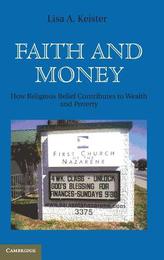
|
Faith and Money: How Religion Contributes to Wealth and Poverty
Hardback
Main Details
| Title |
Faith and Money: How Religion Contributes to Wealth and Poverty
|
| Authors and Contributors |
By (author) Lisa A. Keister
|
| Physical Properties |
| Format:Hardback | | Pages:254 | | Dimensions(mm): Height 235,Width 158 |
|
| Category/Genre | Labour economics |
|---|
| ISBN/Barcode |
9780521896511
|
| Classifications | Dewey:201.73 306.3 |
|---|
| Audience | | Professional & Vocational | | Tertiary Education (US: College) | |
|---|
| Illustrations |
58 Tables, unspecified; 1 Line drawings, unspecified
|
|
Publishing Details |
| Publisher |
Cambridge University Press
|
| Imprint |
Cambridge University Press
|
| Publication Date |
5 September 2011 |
| Publication Country |
United Kingdom
|
Description
For those who own it, wealth can have extraordinary advantages. High levels of wealth can enhance educational attainment, create occupational opportunities, generate social influence and provide a buffer against financial emergencies. Even a small amount of savings can improve security, mitigate the effects of job loss and other financial setbacks and improve well-being dramatically. Although the benefits of wealth are significant, they are not enjoyed uniformly throughout the United States. In the United States, because religion is an important part of cultural orientation, religious beliefs should affect material well-being. This book explores the way religious orientations and beliefs affect Americans' incomes, savings and net worth.
Author Biography
Lisa A. Keister is a professor of sociology and the Director of the Markets and Management Program at Duke University. She conducts research on wealth inequality, asset accumulation and the causes of each. She is the author of Getting Rich: America's New Rich and How They Got There (Cambridge University Press 2005) and Wealth in America (Cambridge University Press 2000). Her research on Chinese corporations and the country's economic transition appeared in her book Chinese Business Groups (2000) as well as various articles.
Reviews'This book is engagingly written with evidence to substantiate each claim. Undergraduate and graduate students will find [it] very insightful, as well as policy makers who are interested in gaining an understanding of not only the economic parity, but also the religious implications of the differentiation in wealth ownership.' Elijah Obinna, Religion
|